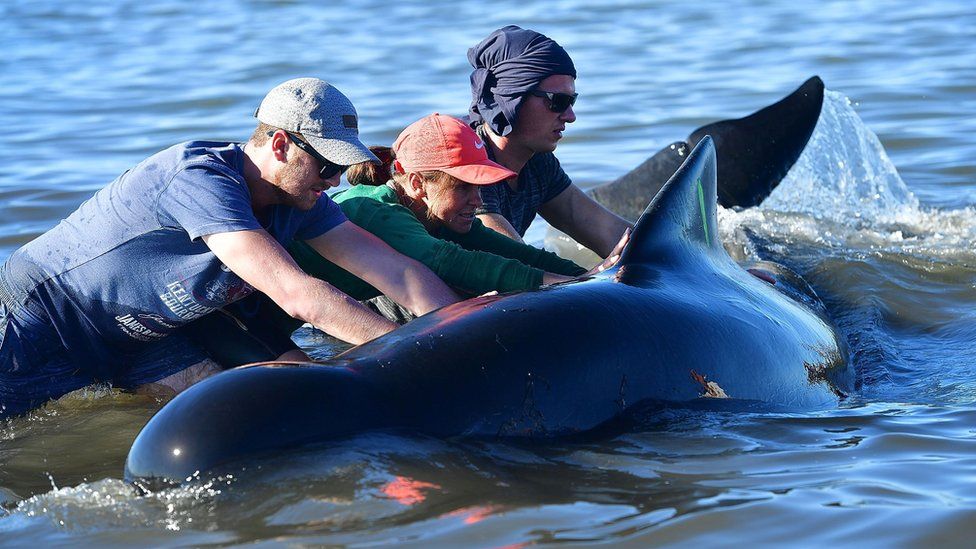New Zealand rescuers refloat 100 stranded whales
- Published

Volunteers in New Zealand have managed to refloat about 100 of the 400 pilot whales that swam aground on a remote beach on Friday.
Many of the whales died overnight at Farewell Spit at the top of the South Island, but those that survived are now swimming in the bay off the beach.
Hundreds of locals managed to rescue the survivors after forming a human chain to refloat the whales.
The incident is one of the worst such cases the country has seen.
On Friday, a number of the whales that had been refloated returned to the beach overnight, but rescue efforts were helped by the high tide and the arrival of a new pod of pilot whales on Saturday morning.
One volunteer said "people from all over the world" were helping to try to save the whales
"Fingers crossed, the new whales are going to lead them out into deeper water," said Andrew Lamason, the department of conservation's regional manager.
However, he added that there was still a chance that they might turn back into Golden Bay.
Mr Lamason said improved weather and clear waters also helped with the latest rescue attempt, but added that he had to warn volunteers about the possibility of stingrays and sharks after one of the dead whales appeared to have bite marks.
Officials on Saturday were also considering how best to dispose of the whale carcasses. Mr Lamason said that simply towing them out to sea could be problematic as they may become gaseous and buoyant and float into populated bays.
Why do whales end up on beaches?
Scientists do not know what exactly causes whales to beach themselves.
But it sometimes happens because the whales are old and sick, injured, or make navigational errors particularly along gentle sloping beaches.
Whales that become beached will send out distress signals attracting other members of their pod, who then also get stranded by a receding tide.
The latest incident in New Zealand was first reported on Thursday evening, but conditions were too dangerous at the time to launch a rescue operation.
The surviving whales were kept alive after "being kept cool, calm and comfortable" by medics and members of the public.
New Zealand has one of the highest stranding rates in the world, with about 300 dolphins and whales ending up on beaches every year, according to Project Jonah.
Many of these incidents happen at Farewell Spit. Experts say its shallow waters seems to confuse whales and hinder their ability to navigate.
In February 2015 about 200 whales beached themselves at the same location, of which at least half died.
- Published14 February 2015
- Published5 November 2014
- Published20 August 2010